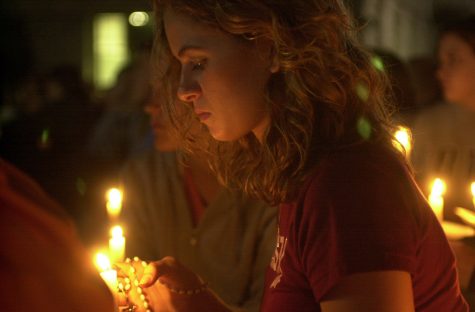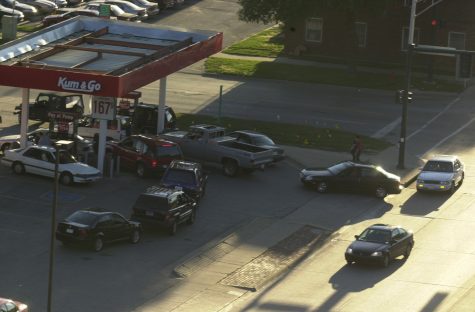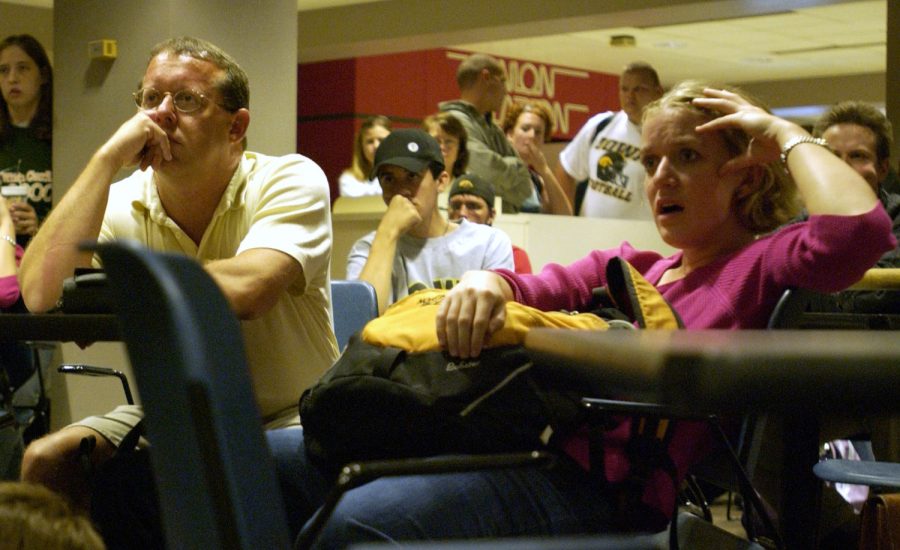Students gathered in the IMU watch news footage of the Sept. 11, 2001 attacks.
Making a plan
September 12, 2021
Most people who remember 9/11 remember exactly where they were when they heard the news. When journalists heard the news, wherever they were, many found themselves in the newsroom immediately afterward to report on it.
Then-DI Editor-in-Chief and current New York Times Business Editor Joe Plambeck was sitting in his apartment when then-DI Publisher Bill Casey called him and told him to turn on the news. The first tower had been hit.
“I saw the second tower get hit, and it was this clear realization that something very, very big was happening,” Plambeck said.
Within a couple of hours, he and other editors at the newspaper were gathered to determine how they wanted to cover the events of the day, Plambeck said.
“‘This is not going to be a day-long story: It’s going to be a long story, so be prepared,’” he remembers the conversation going. “In some ways, it was rallying the troops.”
He said it did not matter what beat a reporter had — everyone was expected to contribute to the coverage, whether on campus or in New York. Even the sports section was filled with 9/11 coverage, as most upcoming games were canceled or postponed because of the tragedy.

UI freshman Elizabeth Feldman sits on the Pentecrest during the candlelight vigil Tuesday evening. UI president Mary Sue Coleman and student body president Nick Klenske were among the speakers in attendance.
Plambeck added that he only wanted to send a few people to New York — those that he knew were experienced and could get the job done.
Lisa Rossi (then Lisa Livermore), former DI reporter and current comedian, was a 20-year-old student at the UI and the DI’s City Editor on 9/11. She said when she heard the news, her first reaction wasn’t to jump into action — it was to turn the radio off and hide.
“No no no no no no no,” she remembered herself saying, shaking her head.
She said she had a strong feeling when she arrived at the Iowa Memorial Union, where she went to bury herself in her history textbook to study and block out the day — she knew it was going to be rough when she entered the newsroom later that day.
“I went to the deepest darkest depths of [the IMU] and I just tuned it out for a while, because I just knew that it was going to be — it was like my last moment of peace for myself,” Rossi said.
Eventually, she entered the DI newsroom. She was the last one there, and she said despite the chaos of the attack, the atmosphere was somber, quiet, and uncomfortable.
“That’s when [Plambeck] asked me, ‘Would you be willing to go to New York?’” she recalled. “I really wanted to say no, but I said yes because my philosophy at that time was to say yes to any story — any opportunity.”
Plambeck said he wanted someone with Rossi’s skills to be there. While photographer Conrad Schmidt and reporter Peter Boylan were eager to cover the attack on the ground, Plambeck said Rossi was a bit more hesitant.
Rossi said her initial reaction came came from a place of fear surrounding the situation.
“I think it was just scary. News is a lot like that, you know? When a new thing happens, sometimes it’s just scary,” she said. “Like, sometimes I had that feeling, even before that, like, ‘I don’t want to go to that fire. I don’t want to see what I’m going to see, but that’s the job.’”
Some of Rossi’s memories are hazy, especially when she was traveling to New York. However, she does remember having to wash her hair in a gas station sink before entering New York.
Map by Molly Milder/The Daily Iowan
Upon arrival, Rossi said the team put on their DI T-shirts and hoped that if Iowans were there, they would reach out to them. She said they ran into the New York University president and interviewed him.
“He was very traumatized. There were things he could not talk about,” she said. “It triggered a lot of traumatic memories, I think from war, for him.”
Flipping through the reporter’s notebook she’d kept with her in New York, Rossi found a note she had written to herself pointing to something strange at the end of the article after her story was published.
“He was like, ‘we weren’t ready for this, we weren’t ready for this,’” she said. “And he was like ‘You know, you’re in Iowa. It’ll get ya.’”
She says he was right.
“I think we in Iowa felt that perhaps maybe this wouldn’t affect us.”
She read more excerpts from her journal — personal notes about her experiences interviewing sources.
“‘I clenched my teeth writing this portion of the narrative. Large buses crammed with volunteers seemed to miraculously materialize from Ground Zero,’” Rossi wrote. “‘I stared at them all with bulging eyes and hands dirtied by death. They angrily stared back … most rejected my pathetic attempts to interview, they dodged my attempts to characterize them as heroes.’”
Twenty years after the attack, it is still difficult for Rossi to talk about during interviews. She said she gets new memories every year, and some of them are rough. This year, however, she was given the gift of a “really beautiful memory.”
“I didn’t do well with 9/11 there. There got to be a point where I got kind of traumatized. And I was drinking, I threw up, I cried and stopped talking,” she said, close to tears. “At some point, me and the team stopped into a comedy club, and the comedian was like, ‘I know this just happened and it's not funny, but I want to keep looking for the light.’”
She said she felt “like garbage” and the comedian was healing for her. It is hard for her to complete interviews on the subject because she feels like she doesn't have a right to be talking about her trauma.
“That’s where I feel like the conflict about that, because for me, it was a pivotal moment in my life as a young adult. So, there’s just a lot of personal drama going on with me,” she said. “But you know, like starting my career, starting my life after this big thing, but there’s still people, I mean, it ruined their lives and they’re still looking for answers. And that’s where I feel so conflicted. I’m like, ‘Who am I to be talking about this?’ But I was a witness to it.”

Rossi said witnessing the aftermath of 9/11 left her without a sense of purpose and caused her to view journalism cynically for a while. She left the DI for two weeks upon her return to Iowa.
"I was just like, 'I've just seen so much, and how does it help? How am I helping?'" she said. "We get into journalism to make a difference and it didn't feel like I was."
She said she has a clip of the article she wrote in her journal — one that she despised.
“I just have such a negative view of it. For me, I didn’t feel that good, although when I read it now, you know, it’s not rocket science: You write down what people say to you — you write down what you saw,” Rossi said. “...I definitely went there being like, ‘Yay, I get to witness history, what a privilege, what a special thing that I would get to do.’ But I didn’t come back feeling like that. I honestly wish I would have not seen that.”
Rossi knew she needed therapy after 9/11 but did not start it up until she was around 37-years-old. Now, she lives her life doing things she wants to do: meditating, exercising, and journaling every day, and prioritizing mental health.
“It's a work in progress, and you know, that’s the thing I’m like, ‘God if I could have just — when I think about some other people getting the help right away — would be so wonderful.’ But it's definitely a big focus in my life, you know, to take care of that,” she said.
